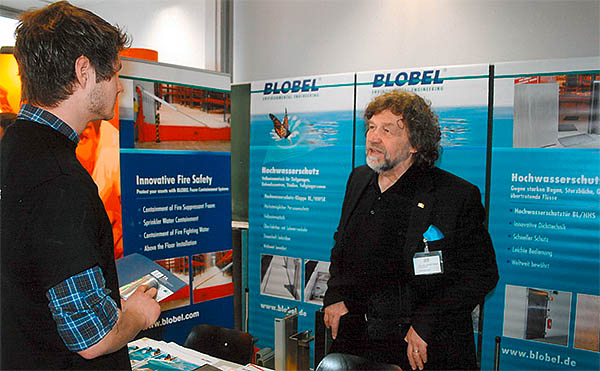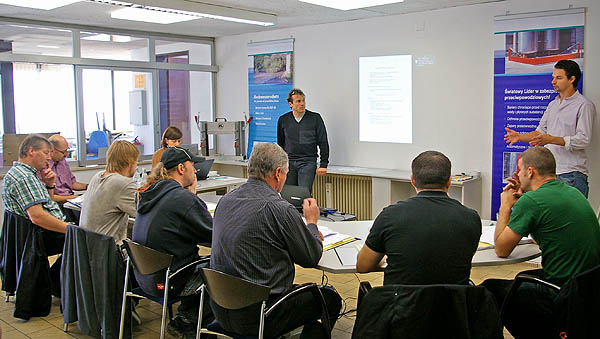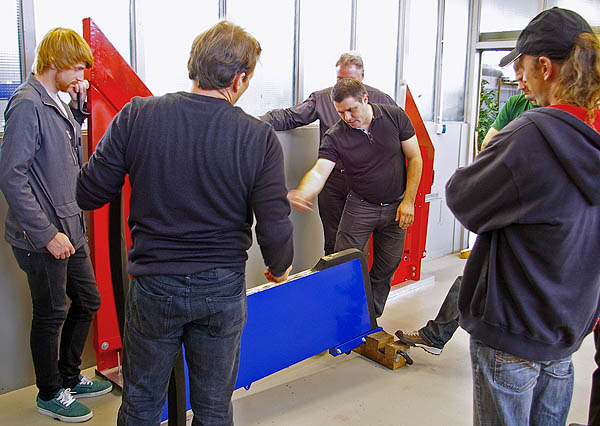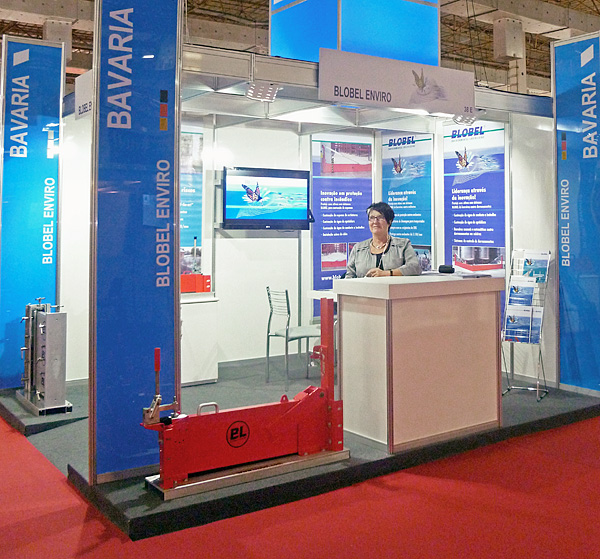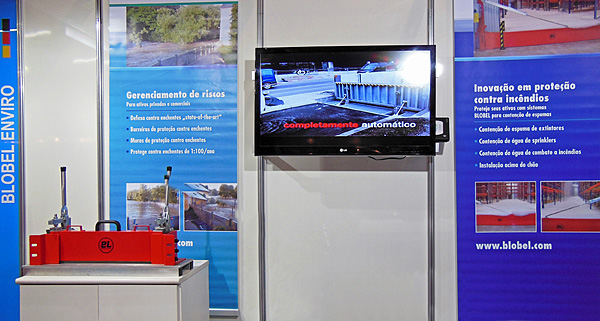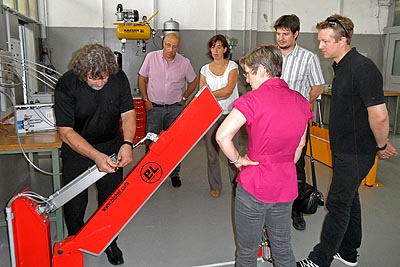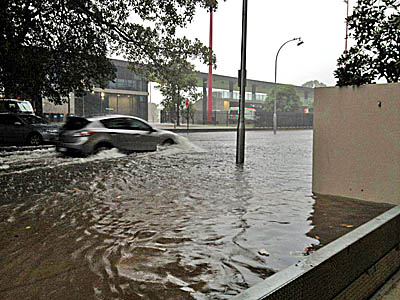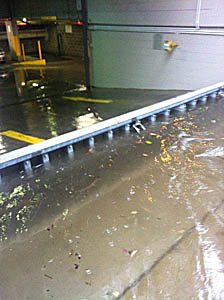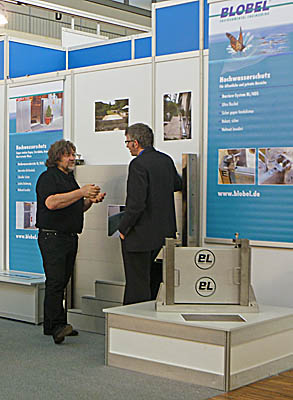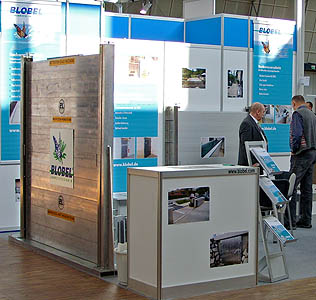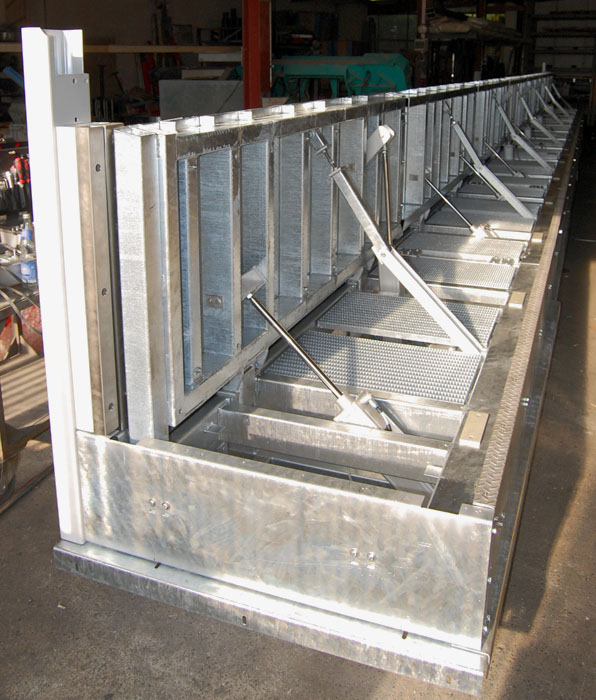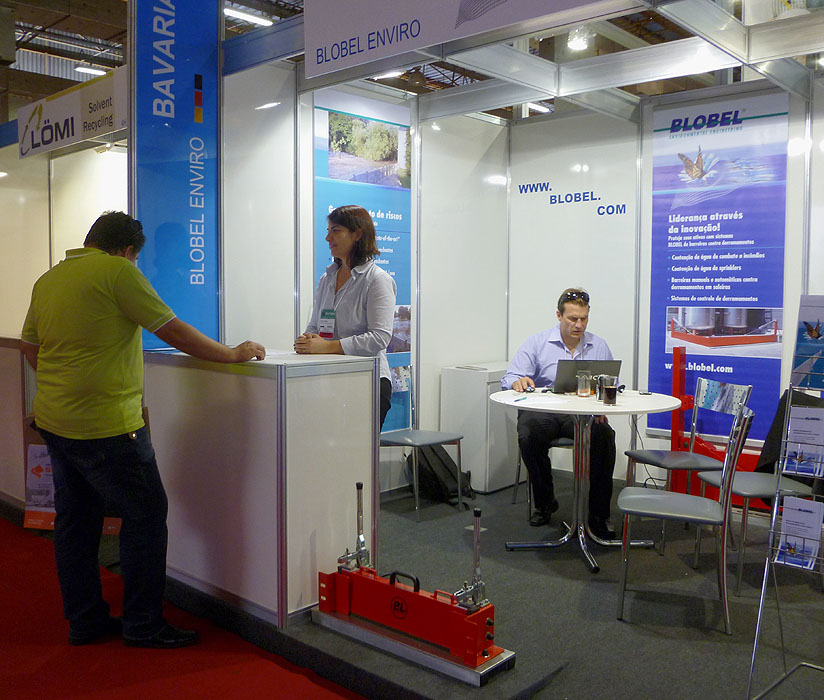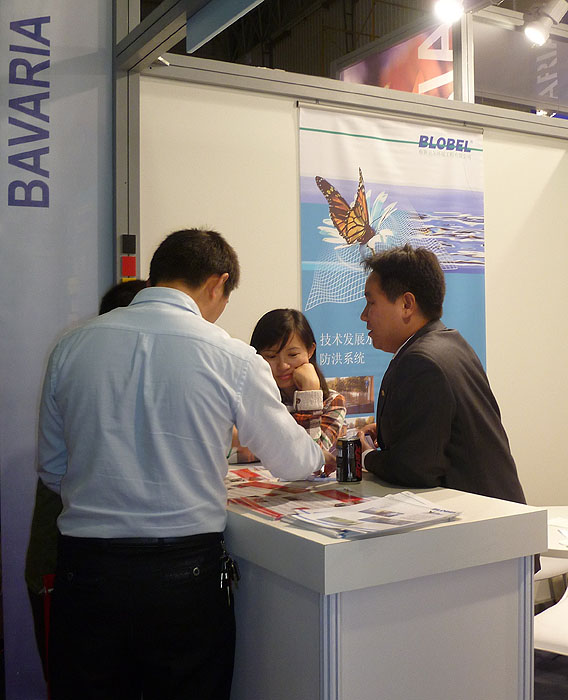At the in-house contact fair organised by the Technikerschule Augsburg in March of this year, BLOBEL presented itself to the technical engineering students as an attractive regional employer. The fair brings together first-time employees and companies. We had a number of interesting conversations with enthusiastic young people, and we now look forward to receiving job applications from this year’s graduates.
Our newly-created training area: a hive of activity
Following our first training course for distributors back in July, the first in a series of training courses for technicians was held on 28 September for our team in Switzerland.
This training day was organised and conducted by Norbert Blobel Jr. and Sebastian Prestel. The morning consisted of theoretical lessons on the subject of Blobel barriers, followed by an afternoon of practical work in the showroom. Topics covered included special mechanical features, fully automatic barriers and the various types of switch cabinets. This gave participants an opportunity to practise setting up and adjusting barriers, troubleshoot faulty switching under the guidance of the instructors, and ask questions related to their daily work. At the end of the day, the many questions posed by the participants were compiled – along with the relevant answers – into a set of practical FAQs.
The high level of interest shown was more than ample confirmation that our current training options are exactly what distributors and technicians need. We’re convinced that their newly-acquired skills, along with the sound knowledge they already possess, will help to provide our colleagues with greater on-site competence and assurance – much to the benefit of our customers. Before leaving for home, the Swiss team were handed certificates of attendance hot off the press.
After a late arrival in Brazil because of technical problems with the flight to São Paulo, things really got going for Gabriele Blobel. As a “one-woman trade fair team”, and with the active support of her tried and tested translator, Frau Daniely, the company boss spent the next three days working under great pressure. For Norbert Blobel was unfortunately unable to travel to FIMAI as planned because he was needed at several construction sites on the other side of the world.
Nevertheless, everything went well: even the plasma TV that had been ordered especially to show our new trade fair film was quickly replaced after first being stolen. The assistance offered by locals, combined with an obviously effective sign language, ensured that the Blobel stand was soon fitted out with sample barriers. Dismantling the stand proved just as unproblematic thanks to the reliability and thoroughness of the helpers and the haulage company.
Although lots of people visited our stand on the first day, there weren’t many trade professionals among them. But this did provide us with ample opportunity to engage in casual conversation as a way of gearing up for the open, communicative and very friendly Brazilians.
The second day brought with it many interesting technical discussions. Our stand was also visited by a number of trade associations, who offered their help in establishing contacts. The third and last day proved to be a very lively one for us, with plenty of specific inquiries. All in all, we were delighted with our participation at the fair and attendance at the joint Bavarian stand. Our new trade fair film was very well received and attracted a lot of interest, and so we’ll be expanding and lengthening it for future use.
On the relaxation side, the programme once again included a feast for the Bavarian exhibitors, this time at a Brazilian steakhouse, where the waiters carry the meat to your table on skewers and slice it straight onto your plate. At the same time, we were able to broaden our horizons with regard to caipirinhas, which are drunk in numerous variations here in its country of origin. There’s the classic de Limão version, but also de Morango e Jabuticaba, de Caju, de Lichia, de Tangerina, Tropical …
The 17th BLOBEL Europe Meeting was held at our plant in Gersthofen on 6 July 2012.
Taking part in the sales training at the new BLOBEL training room on this hot July day were our business partners from Germany, Switzerland, Holland, Belgium, Italy, Denmark and Australia, who had gathered for an update on latest developments in containment systems and flood protection. Time constraints had already obliged our French business associates to attend a separate sales training session weeks earlier.
Based on the experience gained in previous projects, technical director and engineer Joachim Blobel and design engineer Sebastian Prestel did more than take a close look at the features and functionality of the new, fully automatic HWS-K retention barrier. Participants were also given the opportunity to try out the other fully automated models, so as to familiarise themselves with the specifics of the various barrier types – an essential prerequisite for those expected to conduct qualified sales meetings and consultations with interested parties and clients back home.
Of course the training session in Gersthofen also dealt with the somewhat “drier” topics of day-to-day business. These included the many directives and their varying requirements concerning tightness: DIN 19569-4, VdS 2564, Bavaria’s LGA test guidelines, FM approvals, Flood Protection Association ... Here at BLOBEL, we’ve summed up all these different permissible leakage levels into a clear overview for our distributors. All relevant aspects were explained and discussed in detail.
And finally, our export specialist, Elisabeth Wackerl, briefed participants on important changes concerning shipping.
Drastic changes in world trade: starting from 25 March 2013, the status “known consignor” will no longer be valid. Companies must update their certification in time if they wish to obtain the new required status of “approved known consignor” from Germany’s Federal Aviation Office (Luftfahrt-Bundesamt).
EU intra-Community exports to become more complicated: the current “proof of shipment” is to be replaced by “certification of entry”. Companies failing to provide the necessary documentation will face further taxation on their sales tax or value added tax.
The meeting naturally also provided the perfect setting for relaxed and personal conversations and shop talk. All in all, it was an intensive, informative and entertaining day that ended on a convivial note with an evening of food and drinks.
Sydney: Blobel barrier protects underground garage from flooding
An unexpected sight awaited the residents of the Moreton by the Park housing complex in Redfern, Australia, as they looked out of their windows on the morning of 8 March this year: the streets of this Sydney suburb were knee-deep in rainwater. And yet none of them had any cause to worry about their cars, the lift shafts or other sensitive fixtures in the building’s underground garage. Installed at the entrance to the garage more than a year previously, the BL/HWS-K Blobel flood barrier ahad – not for the first time – proved its reliability by automatically moving into position to prevent the basement level in this block of flats from flooding.
In fact, Blobel has installed six other barriers around Redfern Park – and at the entrance to the catacombs of Redfern Stadium – to safeguard against flooding.
BLOBEL at the fair
acqua alta alpina in Salzburg (8–10 March 2012)
This specialised trade fair provided an excellent opportunity for us to hold informative discussions with a good many qualified visitors and decision makers. We even offered advice to the representatives of a major Austrian client – the state of Salzburg – who visited our stand. Since the exhibitors at the fair included competitors, any visitors interested in checking out the quality of our flood protection solutions were able to judge for themselves by making a direct comparison with rival products.
The “European Flood Protection Association” (Europaverband Hochwasserschutz e. V.), founded in Munich on 4 May 2011, introduced itself to experts at the acqua alta trade fair in Hamburg last October. Eighteen companies from five European countries had unanimously voted in favour of founding an association to deal with issues that may affect those involved in flood protection. The proposal resulted, among other things, from an attempt by “numerous stakeholders” to dictate production and safety criteria – especially concerning mobile flood protection systems – to the manufacturers. The association intends to take action against such interference from outside. If the association’s statutes come into force, the current Europe-wide practice of establishing a flood protection system in the run-up to public tenders will also cease. According to the statutes: “Product neutrality in public and corporate tenders will lead flood protection back to the market economy, and it will no longer remain in the hands of small groups.” A research institute will be set up to deal with quality labels and to develop the association’s policy. BLOBEL Umwelttechnik is a member of the association.
BLOBEL has delivered a huge, 20-metre-long barrier with a retention height of 800 mm.
The seven sections were fitted under the supervision of engineer Sebastian Prestel, the designer of the barrier, to protect O’Riordan Street in Sydney (main contractor: Buildline Constructions, owner: SCP, Sydney Corporate Park). Even heavy rain and extremely limited working times – only at weekends and at night from 7 pm to 5 am – could not stop the successful completion of this project. The residents of SCP in Alexandria, NSW, will therefore be able to face the next flood with confidence.
BLOBEL barriers of this kind can, of course, be driven over by a lorry when they are not in operation. In Germany, only two of these models have been fitted so far – all the others have been delivered to Australia.
In November 2011, we attended FIMAI, the international industrial environment and sustainability trade fair held in São Paulo, Brazil. Here, too, we shared an exhibition booth with Bayern International.
It was BLOBEL's first ever participation in a Brazilian trade fair – and it proved to be a wise decision as great interest was shown not only in flood protection but also in containment systems. Fortunately, we had come well prepared with brochures in Portuguese (many thanks to Dr. George Bernard Sperber), for English alone would not have got us very far. Our interpreter, Daniely Jonas Ferreira, was a godsend. A certain Herr Pauluschke from Germany dealt with organizational issues for the exhibiting companies, and did so with true German efficiency. Everything went smoothly. The fair ran from 2 p.m. until 9 p.m. – which we have never experienced anywhere else.
Naturally, BLOBEL also explored the culinary side of Brazil: meat, meat and more meat – with waiters slicing chunks of grilled meat from huge skewers that they carried from table to table. Another interesting experience was the invitation extended to our delegation by Consul General Matthias von Kummer. The torrential rains that flooded the roads as we were leaving Brazil, forcing fountains of water out of the drains, made it clear that this place could really do with BLOBEL products!
In October 2011, BLOBEL participated in the Western China International Fair (WCIF) in Chengdu, sharing a booth with Bayern International. The event was organized within the framework of Bavaria's trade fair promotion programme. This large industrial fair was remarkable for the unbelievably large number of visitors and interested parties yet few decision makers.
A procedure that one can hardly imagine happening here in the West: on the day that a very high-ranking politician visited the fair, the authorities closed off the entire exhibition grounds until 2 p.m. We even had to leave our hotel, which was located on those grounds, at 7 o'clock that morning, otherwise we would not have been allowed to step out of the building. On the other hand, it gave us plenty of time to visit the city's famous Panda Breeding and Research Centre. This was not the only outing on which Mrs. Janli, our interpreter and the wife of our business partner William Ma, proved indispensable. English would not have been enough to cope with everything going on at the fair.
With their command of the Chinese language, the staff members of the German Chamber of Foreign Trade and the Chamber of Industry and Commerce optimally organized the evening events: a Western-style buffet to which our delegation had been invited by the City of Chengdu, the typical Chinese dinner arranged for us by Chengdu Province, as well as a “hotpot” evening, which featured a spicy variation of fondue that is typical of the region. Chinese fairs can be quite strenuous for “long-nose” Europeans...
